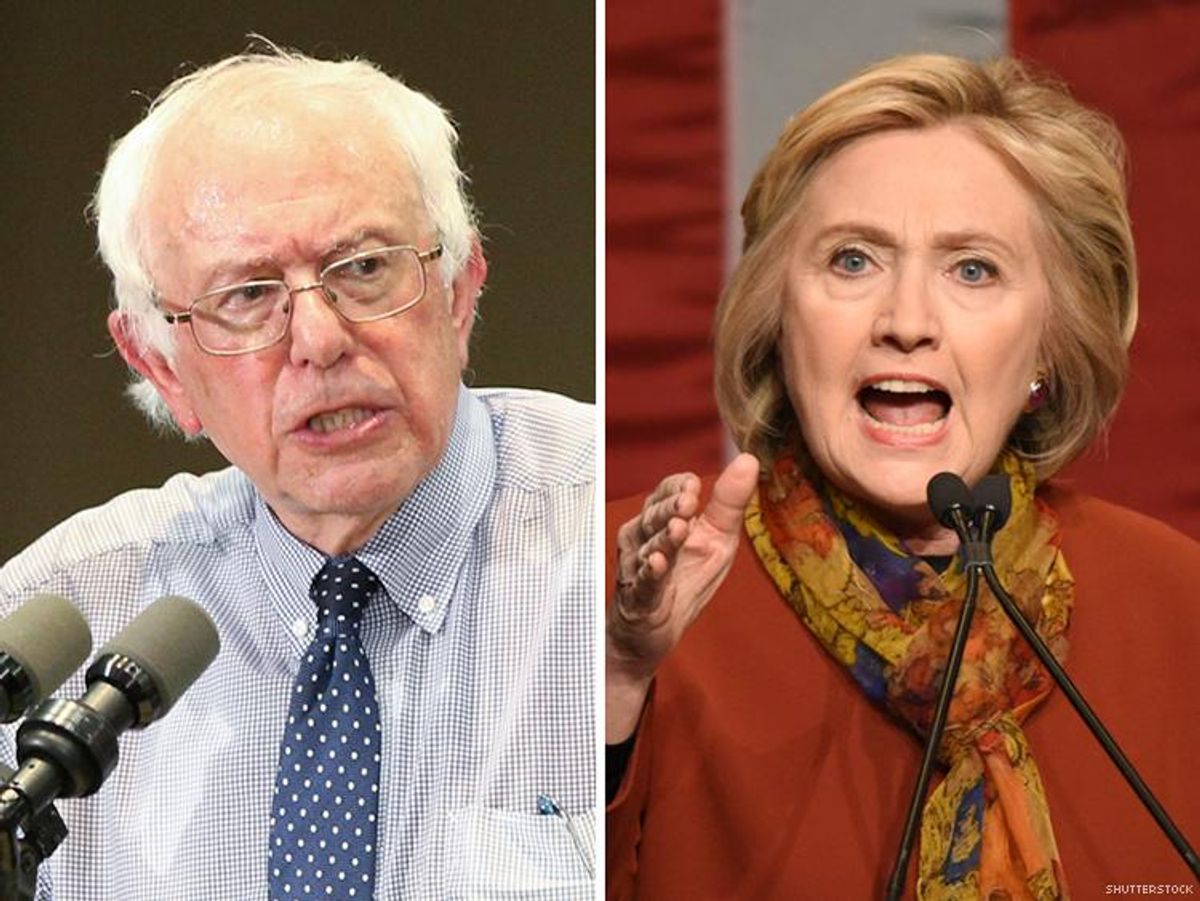As expected, Hillary Clinton held on to a commanding lead of Democratic delegates on Super Tuesday, as voters in 11 states and American Samoa cast their ballots and caucused to choose their nominee for the White House.
By early Wednesday, Clinton had won seven states and one territory-- Texas, Alabama, Arkansas, Tennessee, Georgia, Massachusetts, Virginia, and American Samoa -- securing at least 333 delegates, according to the Associated Press.
Including superdelegates, Clinton has at least 1,001 delegates to date, reports the AP, while Sanders has at least 371. It takes 2,383 delegates to win the nomination
Clinton clinched a major victory by winning Texas, which has a whopping 222 delegates total. Although the final distribution of delegates was still being calculated, the AP reports that Clinton has been apportioned 122 delegates and Sanders 48. The AP called that state's race in her favor moments after polls closed at 9 p.m. Eastern.
As news came down that Clinton had secured a victory in Texas, she took the stage to throngs of cheering supporters in Miami.
Clinton's tone was victorious, as she advanced a populist message that seemed designed to appeal to Sanders supporters who may be coming to terms with the inevitability of her nomination. Specifically, she made entreaties for clean energy, immigration reform, reigning in student loan debt, battling police brutality, and empowering disenfranchised voters, specifically in North Carolina.
"The stakes have never been higher, and the rhetoric has never been lower," Clinton said in a quip clearly directed at her Republican challengers. "They're trying to divide us and them, but it's not going to work. We're all in this together."
"We have to defend all our rights," Clinton continued. "Workers' rights and women's rights, civil rights and voting rights; LGBT rights and rights for people with disabilities."
In two separate instances, she channeled her campaign messaging and applauded the progress made under President Obama, urging voters to elect her to continue the progress made under Obama.
"That starts by standing with President Obama when he nominates a strong progressive justice for the Supreme Court," she said.
As Clinton was speaking in Miami, the AP reported that Sanders had won Oklahoma, giving the longtime independent his second victory of the night. That state has 38 delegates to award, and while it's still unclear how the final tally will come down, Sanders told supporters in Vermont that he was planning to win "hundreds of delegates." Given the strong support in his home state and Oklahoma, Sanders also promised supporters he will remain in the race, according to the AP.
Celebrating his Super Tuesday win in Vermont, Sanders told supporters, "This campaign is not just about electing a president, it is about making a political revolution."
He continued:
"What that revolution is about is bringing millions of millions of people into the political process--working people who have been so disillusioned they no longer vote and young people who have never been involved. What the political revolution is about is bringing out people together--black, white, Latino, Asian-American, gay, straight, people born in America, and people who have immigrated to America. When we bring our people together what we do not allow is the Donald Trumps of the world to divide us up."
As polls closed in Alabama and Tennessee, the AP called both states for Clinton. Alabama has 53 delegates to award, while Tennessee has 67 delegates; both states award delegates proportionally. Clinton also won over voters in American Samoa, which has 11 delegates up for grabs.
Clinton also swept Arkansas, the state where her husband, Bill, was born and served as governor before being elected president in 1992. Clinton will pick up most of the state's 32 delegates.
By 8 p.m. Eastern, the AP had declared Clinton victorious in Georgia and Virginia, while Sanders swept his home state of Vermont. Each of those three states award delegates proportionally, with Georgia offering a total of 102 delegates, Virginia boasting 95, and Vermont offering 26, including 10 superdelegates.
There were 859 delegates up for grabs in the Super Tuesday states. Heading into today's nominating contests, Clinton had secured 91 delegates thus far, while Sanders had 65.
In the final days before voters across the nation turned to the polls, both Democats hit the campaign trail.
Clinton launched a salvo at Republican front-runner Donald Trump, who spent the weekend flip-flopping as to whether he would formally disavow the endorsement of former Ku Klux Klan leader David Duke, who told his own followers that any white person not voting for Trump is a traitor to their "heritage."
"I was very disappointed that he did not disavow what appears to be support from David Duke and the Klan," Clinton told CNN's Jake Tapper. "That is exactly the kind of statement that should be repudiated upon hearing it."


















































































